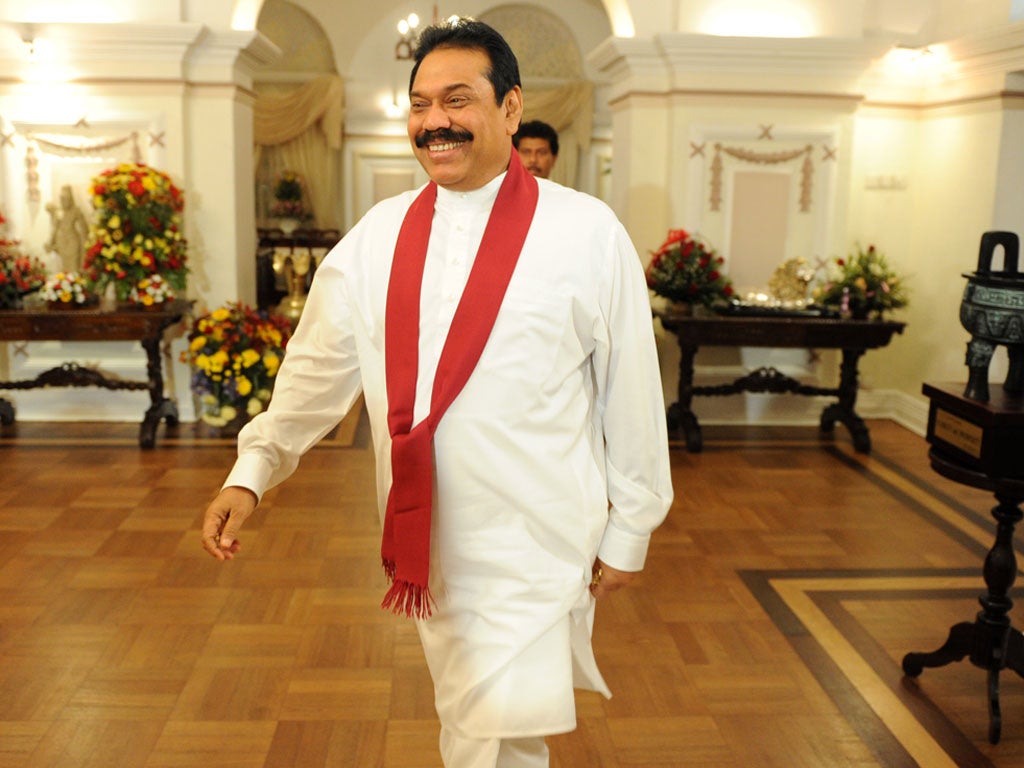We wrote Sri Lankan President's civil war speech, say lobbyists
Exposed: Public relations firm's dealings with some of the world's most controversial regimes

Your support helps us to tell the story
From reproductive rights to climate change to Big Tech, The Independent is on the ground when the story is developing. Whether it's investigating the financials of Elon Musk's pro-Trump PAC or producing our latest documentary, 'The A Word', which shines a light on the American women fighting for reproductive rights, we know how important it is to parse out the facts from the messaging.
At such a critical moment in US history, we need reporters on the ground. Your donation allows us to keep sending journalists to speak to both sides of the story.
The Independent is trusted by Americans across the entire political spectrum. And unlike many other quality news outlets, we choose not to lock Americans out of our reporting and analysis with paywalls. We believe quality journalism should be available to everyone, paid for by those who can afford it.
Your support makes all the difference.Senior executives at Bell Pottinger told undercover reporters that they were so influential that they had written a key speech given by the Sri Lankan President to the United Nations.
During the address by President Mahinda Rajapaksa last year, which the company said was used in preference to one prepared by the Sri Lankan foreign ministry, the President suggested rules governing the humanitarian conduct of war should be re-examined. He also described his troops' action against Tamil Tiger separatists as humanitarian.
President Rajapaksa also claimed in the speech that a Commission established by the government to look into the last years of the civil war, was giving "full expression to the principles of accountability". The Commission has been heavily criticised by human rights groups including Amnesty International because it does not have a mandate to hold individuals to account for war crimes.
"We had a team working in the President's office. We wrote the President's speech to the UN last year which was very well received... it went a long way to taking the country where it needed to go," David Wilson, the chairman of Bell Pottinger Public Relations, said during the meeting with undercover reporters.
But during the meeting Mr Wilson seemed to agree with Amnesty, describing the Commission as having a "fundamental flaw in its remit in investigating what has gone on in the past, to try to bury the past".
The company also attended a meeting of Tamil dissidents in London, the British Tamils Forum (BTF) said. Days before President Rajapaksa's arrival in London in December 2010, Tim Ryan, the chairman of Bell Pottinger International, and a colleague attended an open political meeting in Harrow organised by the BTF and the Nava Sama Samaja [New Social Equality] Party.
Gobi Ratnam, a Tamil journalist who chaired the event said the pair stood out as the only white people present. They said they were from Bell Pottinger. "They said they wanted to listen to our problems, to learn and help the Sri Lankan people," Mr Ratnam said. "A lot of people were talking to them."
Dr Wickremabahu Karunaratne, the Sinhalese general secretary of the NSS Party who ran for president in 2010, gave a speech at the meeting in which he called for Tamil forces to join a new alliance of opposition members and breakaway groups to challenge the government – comments that were widely reported.
There is no suggestion that Bell Pottinger did anything illegal in its dealings with the Sri Lankan government.
Part of Bell Pottinger's remit was to influence the foreign media in favour of the Sri Lankan government.
The firm sub-contracted its work in the United States to the firm Qorvis, which placed an article by President Rajapaksa in the Philadelphia Inquirer in December 2009 entitled "How Sri Lanka Defeated Terrorism". In the piece the President suggested Sri Lanka had provided a "workable model" for defeating terrorism, from which the international community could gain "valuable insight".
In February 2010, the Wall Street Journal published a piece that discussed the "peaceful" election which returned Rajapaksa to power, and prompted several letters complaining of government violence against its critics.
Bell Pottinger has been less successful at placing such articles in the UK press. the government's opinions. In December 2009 the firm reportedly pitched a piece to The Guardian which it declined to publish.
* Caught on camera: top lobbyists boasting how they influence the PM
* The Sting: The fake 'Asimov Group' meets Bell Pottinger
* The Transcript: 'David Cameron raised it with the Chinese Prime Minister'
* We wrote Sri Lankan President's civil war speech, say lobbyists
* Vicious dictatorship which Bell Pottinger was prepared to do business with
* Oliver Wright: Vested interests are entitled to argue their case, but it must be in the open
* Andrew Grice: Plenty of talk about cracking down on lobbying – but still there's no action
* Leading article: Evidence of a lobbying industry out of control
Join our commenting forum
Join thought-provoking conversations, follow other Independent readers and see their replies
Comments